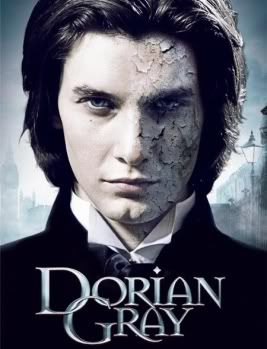
Dorian Gray stars Colin Firth (A Single Man) with Ben Barnes (Prince Caspian) in the title role and is based upon the 1890 novel The Picture of Dorian Gray by Oscar Wilde.
The film tells the tale of a young man, Dorian Gray, who comes to London after inheriting his family estate. He is naive and innocent and also exceptionally attractive and charismatic yet unaware of the effect he can have on people. Dorian is taken under the wing of Lord Henry Wotton who imbues the impressionable young man with his own hedonistic worldview: the unfettered guilt free pursuit of pleasure. At the same time Dorian has his portrait painted by Basil Hallward, a talented artist who has become besotted with his young model. Dorian succumbs to Lord Henry’s temptations of unadulterated pleasure seeking and enjoys himself so much he makes an unwitting Faustian pact to always keep what according to Sir Henry are “the only two things in life that mean anything…youth and beauty.” And so begins a story of corruption, vanity, morality and murder that ultimately leads to Sir Henry having to confront the monster that he has made to protect his grown up daughter who, now twenty years later, has fallen for the still youthful Dorian just returned from years spent travelling.
I’ve never read Wilde’s novel nor seen any of the previous adaptations (except for Stuart Townsend in The League of Extraordinary Gentlemen) but I was familiar with the story as I expect many are. It is a classic fable of corrupted youth, of unhinged vanity and absent morality. I’m told by people who know that this film version directed by Oliver Parker remains pretty faithful to Wilde’s original novel and its themes. It certainly shows the overt and quite graphic sexuality that Wilde had to tone down in his revised 1891 edition. The film is handsomely mounted with convincing art direction and very fine cinematography by the great Roger Pratt (Brazil, Batman, The Fisher King, Chocolat, Harry Potter.) The use of subtle digital effects to recreate Victorian London also works well as they do in creating Dorian’s monstrous true self. In the title role Ben Barnes looks the part and does a reasonable job in showing the transformation of a young innocent who gradually strips away all conscience and morality to begin enjoying the wild times, before, many years later, realising he is living a hollow, haunted, pointless life. Barnes is okay, but to me he doesn’t have the charisma to make you believe that all these men and women would be so easily in awe of him. On the other hand, Colin Firth, an actor I’ve never really cared for, is excellent as the corrupting older man/monster maker who ultimately comes to realise what he has created when his own daughter falls under Dorian’s spell. They are well supported by a strong cast including Rachel Hurd-Wood, Ben Chaplin and one time Bond girl Maryam D’Abo. Parker directs in an unflashy manner just telling the story through the actors and the solid script using no great flourishes of style, which is a smart move. Wilde’s brilliant story simply doesn’t need any flash, as such things would only detract from its power.
Watching Dorian Gray I was reminded a great deal of Interview with the Vampire, one of my fave books and films. I wouldn’t be surprised if Anne Rice is a fan as they share many of the same themes. The attraction of eternal youth and beauty and its almost hypnotic power over others, the deliberate moral corruption of another, the idea of freedom being achieved when released from conscience, guilt and consequence. The eventual hollowness, loneliness, stagnation of never changing or growing. And the ultimate realisation of the price that has to be paid for ones actions and decisions. For there is always a price to be paid sooner or later. And then of course there is the strong homoerotic subtext in both works with Dorian Gray’s being rather more overt – at least in this version.
A solid, good looking, entertaining fable with strong production values and a simply brilliant story to tell, Dorian Gray is worth seeking out even though you won’t be quite as entranced by his power as you should be.

You're quite right, this is a brilliant story. But there was little to be gained from the telling of the story, in this case.
ReplyDeleteA good, solid adaptation. But one suspects there's a 'Bram Stoker's Dracula-esq' interpretation to be done, one day, that will milk this classy yarn for everything that it's worth.
(Considering how dull Colin Firth normally is, I was rather impressed with his turn here.)